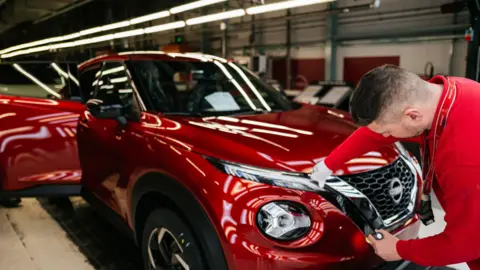Nissan, one of Japan’s leading automotive manufacturers, has announced a significant restructuring plan that will see the company eliminate an additional 11,000 jobs as part of its efforts to combat declining sales in critical markets such as the United States and China. This latest round of job cuts adds to the previous layoffs and brings the total number of positions eliminated within the last year to around 20,000—accounting for approximately 15% of Nissan’s global workforce.
The moves come as a necessary response to the carmaker’s underperformance in its key markets, where sales have not met expectations. Nissan currently employs around 133,500 individuals globally, including approximately 6,000 workers at its manufacturing facility in Sunderland, UK. The company has not specified the exact locations of the job cuts or how many positions may be affected in Sunderland, although it is clear that the restructuring will entail a broader strategy to streamline operations.
Part of this strategy includes a significant reduction of its manufacturing footprint. Nissan plans to decrease the number of its plants from 17 to 10 by the year 2027, demonstrating a decisive shift towards a more efficient production model in response to dwindling demand for its vehicles. This decision reflects a growing trend in the automotive industry where manufacturers are compelled to adapt to changing market conditions and consumer preferences.
The recent layoffs are a continuation of a broader cost-cutting initiative that Nissan began with an announcement in November, which included the cutting of 9,000 jobs as the company aimed to curtail global production by a substantial 20%. Such drastic measures indicate that Nissan is facing significant headwinds, as it seeks to navigate an increasingly competitive market.
In addition to the planned job reductions, Nissan encountered challenges in its corporate strategy this year when discussions for a potential merger with rival Honda fell apart. The desired collaboration aimed for a merger valued at approximately $60 billion (£46 billion), which would have established a formidable automotive giant ranking as the fourth largest in the world by vehicle sales, behind Toyota, Volkswagen, and Hyundai. The failure of these negotiations led to considerable changes in Nissan’s leadership, with Makoto Uchida being succeeded by Ivan Espinosa, who previously served as the company’s chief planning officer and headed its motorsports division.
The implications of these changes extend beyond job losses; they prompt significant questions about the future trajectory of Nissan in a rapidly evolving marketplace. With electric vehicles (EVs) gaining traction and consumer demand shifting towards more sustainable options, the automaker must reevaluate its product line, technological investments, and overall corporate strategy to regain competitiveness.
Nissan’s journey in the coming years will depend heavily on how effectively it can implement these job cuts and factory shutdowns while simultaneously investing in future opportunities. The automotive industry continues to face an array of challenges, including global supply chain disruptions and changing consumer preferences, which necessitate strategic shifts among manufacturers striving to maintain their market positions.
In a nutshell, Nissan’s decision to eliminate thousands of jobs and reduce its manufacturing capabilities is emblematic of the larger challenges faced by the automotive industry. As the third-largest automaker in Japan, the company finds itself at a critical juncture, needing to adapt rapidly to support its survival and growth in the face of significant market pressures.



